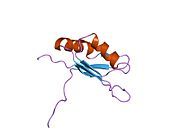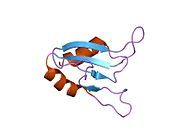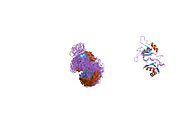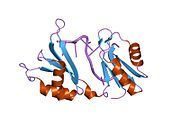ELAV-like protein 2
Appearance
(Redirected from Elav-like protein 2)
ELAV-like protein 2 is a protein that in humans is encoded by the ELAVL2 gene.[4][5]
References
[edit]- ^ a b c GRCm38: Ensembl release 89: ENSMUSG00000008489 – Ensembl, May 2017
- ^ "Human PubMed Reference:". National Center for Biotechnology Information, U.S. National Library of Medicine.
- ^ "Mouse PubMed Reference:". National Center for Biotechnology Information, U.S. National Library of Medicine.
- ^ Han J, Knops JF, Longshore JW, King PH (Feb 1997). "Localization of human elav-like neuronal protein 1 (Hel-N1) on chromosome 9p21 by chromosome microdissection polymerase chain reaction and fluorescence in situ hybridization". Genomics. 36 (1): 189–91. doi:10.1006/geno.1996.0444. PMID 8812435.
- ^ "Entrez Gene: ELAVL2 ELAV (embryonic lethal, abnormal vision, Drosophila)-like 2 (Hu antigen B)".
Further reading
[edit]- Gao FB, Carson CC, Levine T, Keene JD (1994). "Selection of a subset of mRNAs from combinatorial 3' untranslated region libraries using neuronal RNA-binding protein Hel-N1". Proc. Natl. Acad. Sci. U.S.A. 91 (23): 11207–11. Bibcode:1994PNAS...9111207G. doi:10.1073/pnas.91.23.11207. PMC 45196. PMID 7972035.
- King PH, Levine TD, Fremeau RT, Keene JD (1994). "Mammalian homologs of Drosophila ELAV localized to a neuronal subset can bind in vitro to the 3' UTR of mRNA encoding the Id transcriptional repressor". J. Neurosci. 14 (4): 1943–52. doi:10.1523/JNEUROSCI.14-04-01943.1994. PMC 6577146. PMID 8158249.
- Gao FB, Keene JD (1997). "Hel-N1/Hel-N2 proteins are bound to poly(A)+ mRNA in granular RNP structures and are implicated in neuronal differentiation". J. Cell Sci. 109 (3): 579–89. doi:10.1242/jcs.109.3.579. PMID 8907704.
- Park S, Myszka DG, Yu M, et al. (2000). "HuD RNA recognition motifs play distinct roles in the formation of a stable complex with AU-rich RNA". Mol. Cell. Biol. 20 (13): 4765–72. doi:10.1128/MCB.20.13.4765-4772.2000. PMC 85909. PMID 10848602.
- Strausberg RL, Feingold EA, Grouse LH, et al. (2003). "Generation and initial analysis of more than 15,000 full-length human and mouse cDNA sequences". Proc. Natl. Acad. Sci. U.S.A. 99 (26): 16899–903. Bibcode:2002PNAS...9916899M. doi:10.1073/pnas.242603899. PMC 139241. PMID 12477932.
- Humphray SJ, Oliver K, Hunt AR, et al. (2004). "DNA sequence and analysis of human chromosome 9". Nature. 429 (6990): 369–74. Bibcode:2004Natur.429..369H. doi:10.1038/nature02465. PMC 2734081. PMID 15164053.
- Gerhard DS, Wagner L, Feingold EA, et al. (2004). "The status, quality, and expansion of the NIH full-length cDNA project: the Mammalian Gene Collection (MGC)". Genome Res. 14 (10B): 2121–7. doi:10.1101/gr.2596504. PMC 528928. PMID 15489334.
- Yano M, Okano HJ, Okano H (2005). "Involvement of Hu and heterogeneous nuclear ribonucleoprotein K in neuronal differentiation through p21 mRNA post-transcriptional regulation". J. Biol. Chem. 280 (13): 12690–9. doi:10.1074/jbc.M411119200. PMID 15671036.









